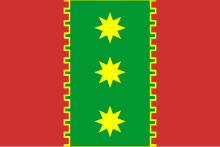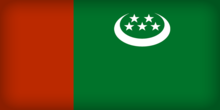Tabasaran people
 | |
 | |
| Total population | |
|---|---|
| c. 155,000 | |
| Regions with significant populations | |
| 151,466[1] | |
| 977[2] | |
| Languages | |
| Tabasaran | |
| Religion | |
| Sunni Islam | |
| Related ethnic groups | |
| Northeast Caucasian peoples | |
Tabasarans are a Northeast Caucasian ethnic group native predominantly to southern part of the North Caucasian republic of Dagestan. Their population in Russia is about 150,000. They speak the Tabasaran language. They are mainly Sunni Muslims.
History
The earliest mention of the Tabasarans are found in 7th century Armenian sources referring to them as an independent people of Dagestan. Arab historians referred to their land as "Tabarstan". In the 8th century, the Arabs conquered parts of the Caucasus including the territory of the Tabarsarans. In the 15th century, the Tabasrans formed a powerful principality called the Maisumat of Tabarsaran. However, the state was eventually divided into two due to internal struggles and both were conquered by the Russians in the early 19th century.[3]
Culture

Language
The main language of the Tabasaran people is the Tabasaran language (табасаран чIал, tabasaran ҫ̇al),[4] which belongs to the Lezgic branch of Northeast Caucasian language family. It is closely related to neighbouring Lezgian and Aghul languages.[5] UNESCO classifies Tabasaran language as "vulnerable".[6] According to 2002 Russian census 97% of the Tabasaran can speak their ancestral language and a further 87% of them know Russian.[7]
Under Soviet control Tabasaran has become one of the official languages of Dagestan.
Religion
The vast majority of Tabasarans profess Sunni Islam and belong to the Shafi'i school. Some elements originated from pre-Islamic Tabasaran beliefs, such as deity names and annual spring celebration known as Elbetsan (parallel to Iranic Nowruz and Lezgian Yaran-Suvar) have been preserved in the contemporary Tabasaran society.[7][8]
Economy
Tabasaran traditional economy has been based on agriculture and animal husbandry, as the regions inhabited by the group have a mild and warm climate with abundant water sources. Agriculturally grain farming, orchards and viticulture is common among the people. Carpet weaving, leatherworking, woolen clothes, woodworking and beekeeping form the domestic industries.[7]
Notable people
- Russian pole vaulter Yelena Isinbayeva and Kamal Khan-Magomedov, the 2015 European Games champion in men's Judo -66 kg, are both half-Tabasaran.
- Rustam Muradov, Colonel General in the Russian Armed Forces.
- Zumrud Khanmagomedova, the first Tabasaran woman who received a higher education and the first Tabasaran poetess.
References
- ^ "Оценка численности постоянного населения по субъектам Российской Федерации". Federal State Statistics Service. Retrieved 31 August 2024.
- ^ "About number and composition population of Ukraine by data All-Ukrainian census of the population 2001". Ukraine Census 2001. State Statistics Committee of Ukraine. Retrieved 17 January 2012.
- ^ Akiner, Shirin (1986). Islamic Peoples Of The Soviet Union. Routledge. pp. 156–157. ISBN 978-1-136-14266-6.
- ^ "Tabasaran". Ethnologue. Retrieved 2021-07-02.
- ^ "Glottolog 4.4 - Tabasaran". glottolog.org. Retrieved 2021-07-02.
- ^ "Atlas of languages in danger | United Nations Educational, Scientific and Cultural Organization". www.unesco.org. Retrieved 2021-07-02.
- ^ a b c Cole, Jeffrey E. (2011-05-25). Ethnic Groups of Europe: An Encyclopedia: An Encyclopedia. ABC-CLIO. ISBN 978-1-59884-303-3.
- ^ "Dagestan marks Nowruz". vestnikkavkaza.net. Retrieved 2021-07-02.

